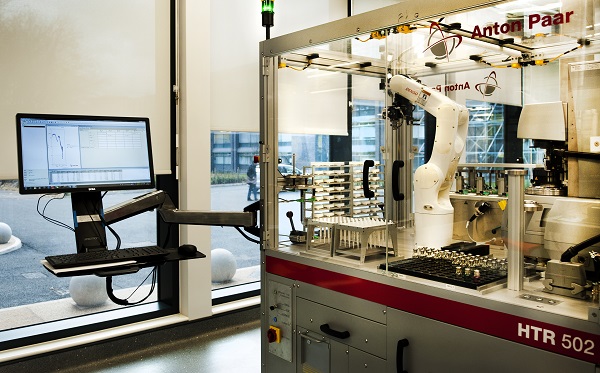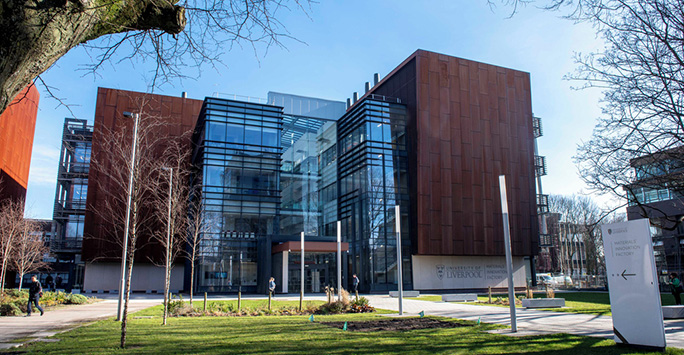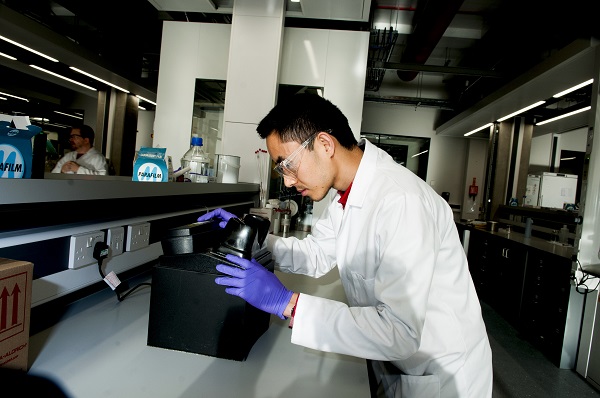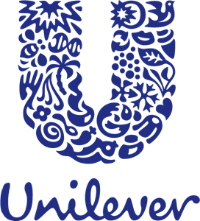Unilever and the University of Liverpool
The University of Liverpool has a very close relationship with Unilever, and our partnership is a leading example of Knowledge Exchange (KE) practices between academia and industry. Unilever is a well-established global consumer goods company and their work within the Materials Innovation Factory (MIF) focuses on developing formulated materials. However, the collaborative projects with the University cover a much broader range of activities with equally broad impacts.
The scientific partnership between Unilever and the University of Liverpool started in 1917, beginning with relationships focussed around the then Department of Industrial Chemistry and biochemistry research. Since 2001, the collaboration has become an established, high-level strategic partnership, combining the University’s and Unilever’s research expertise to develop new materials and formulations, spin-out companies and co-funding of cutting-edge facilities.
The MIF is the flagship knowledge exchange centre, providing a centre of research for over 200 Unilever R&D staff along with a similar number of University of Liverpool researchers. The MIF builds on the success of the University’s Centre for Materials Discovery (2007-2015), whose automated material discovery programmes delivered significant impacts, including an increase in Unilever product sales >€500 M p.a. from 2018 and accelerating the processes of Unilever molecule discovery to product launch in less than two years.
The MIF subsumed the Centre for Materials Discovery when it launched in 2017, and is a world-class centre of materials chemistry expertise and facilities with one of the highest global concentrations of materials science robotics. Professor Andy Cooper, MIF Founding Academic Director and Royal Society Research Professor, led on the strategic bid that led to the creation of the £81m facility.
 “Unilever has had a relationship with the University of Liverpool for more than 100 years” commented Jon Hague, Head of Clean Future Science and Technology, Unilever Homecare. “To compete successfully, collaboration is key and the University is one of the world’s leading academic institutions for materials science. Increasingly, innovation comes from strong partnerships which allow the sharing of expertise.”
“Unilever has had a relationship with the University of Liverpool for more than 100 years” commented Jon Hague, Head of Clean Future Science and Technology, Unilever Homecare. “To compete successfully, collaboration is key and the University is one of the world’s leading academic institutions for materials science. Increasingly, innovation comes from strong partnerships which allow the sharing of expertise.”
The MIF is an excellent reflection of the distinctive partnership model between Unilever and the University as an open access innovation facility that provides specialised space, differentiated equipment and methodologies, skilled technical support and academic thought leadership. Dr Matt Reed, Strategic Director of the MIF, manages Unilever’s relationship with the University at an institutional level and works to create, maintain and exploit strategic high impact innovation partnerships. “The partnership represents the concept of having a shared capability,” he describes. “Instead of agreeing on the research outcomes you want, agree on equipment base and scientific platforms that you are jointly going to use, but use them in a different way.”

World-leading microbiome research
In 2016, Unilever and the University of Liverpool partnered to open the MIF OMICs Facility (covering the scientific study of biological molecules, such as genomics, metabolomics and proteomics), which offers access to genomic sequencing platforms, computational biology infrastructure and technical expertise. As part of the Centre for Genomics Research, with which Unilever has also maintained a long-term partnership, it highlights the importance of high-throughput technologies and multi-disciplinary research in new materials development.
Alongside the applications to chemical and materials development, this collaboration offers the opportunity to research the human microbiome, leading to the recently established Microbiome Innovation Centre and furthering the strategic partnership with Unilever. As a centre for academic and industrial innovation, this collaboration enables in-depth research into the oral and skin microbiomes and has already enabled Unilever to develop first-to-market toothpaste and skincare products.
Mike Hoptroff, Senior R&D Manager at Unilever, said: “For me as a microbiome research leader at Unilever, it’s been a big unlock for us. We have done multiple large microbiome studies with the University that have been hugely impactful. We have a number of studies going forward in collaboration with the University of Liverpool. Because the scientific engine is there, we can point that towards different conditions of interest. It’s allowed us to further increase our ambitions in this space.”
Unilever and the University of Liverpool have also been awarded a Knowledge Transfer Partnership (KTP) grant to investigate the relationship between the human skin microbiome and our overall wellbeing, combining cutting-edge microbiome analysis with psychological research. Unilever has been partnering with the University on other neuroscience research, including how the brain processes a variety of stimuli as well as brain imaging and neurobiological indicators of stress and wellbeing.
Unilever archives
Whilst the long collaboration between Unilever and the University of Liverpool has had an impact on a variety of science, technology, engineering and maths (STEM) fields, there have been opportunities to create wider societal impacts. In 2020, following the growing prominence of the Black Lives Matter movement, Unilever approached the University of Liverpool to support them in undertaking a transparent review of the business practices of one of Unilever’s founders (and one of the University’s benefactors) from 1900-1930 in the Belgian Congo (now Democratic Republic of the Congo) and the Solomon Islands. This collaboration with the Faculty of Humanities & Social Sciences builds on previous research at Unilever’s Archives, and hopefully opens the door to more such collaboration between Humanities and business. In addition, this partnership helps to build audiences for humanities research outside of academia as well as contributing to a major issue for companies today.
Sustainable research
 The University’s long-term partnership has provided exciting opportunities to establish high-profile sustainability projects with large sources of funding. Across 2020 and 2021, the university’s Knowledge Exchange team led collaborative innovation workshops, enabling academic colleagues to engage in new areas of Unilever’s business. This helped facilitate the process of moving ideas forward to become fast-tracked projects for transformative change.
The University’s long-term partnership has provided exciting opportunities to establish high-profile sustainability projects with large sources of funding. Across 2020 and 2021, the university’s Knowledge Exchange team led collaborative innovation workshops, enabling academic colleagues to engage in new areas of Unilever’s business. This helped facilitate the process of moving ideas forward to become fast-tracked projects for transformative change.
As part of an £8.8 million EPSRC Prosperity Partnership announced in 2021, the University of Liverpool, Unilever and the University of Oxford are developing new platforms to provide a sustainable global chemical supply chain, helping the UK achieve Net Zero by 2050. “To achieve the UK’s Net Zero goal by 2050 we need a transformation of the global chemical supply chain” described Richard Slater, Chief R&D Officer at Unilever. “This partnership is an important milestone towards this, driving forward important research on new renewable and biodegradable materials for everyday products, such as laundry detergents”.
The Research and Partnerships team within the Research Partnerships and Innovation Directorate were instrumental to the Prosperity Partnership application process through pre-call scoping, bid development and critical support, as well as providing mock interviews and performance feedback for the application team. Prosperity Partnerships are business-led research partnerships with long-term strategic university partners, and this Cleaner Futures project led by Professor Matthew Rosseinsky (Department of Chemistry) will be key for developing new materials through the MIF and driving clean growth, helping Unilever to find sustainable routes for the production of chemicals used in consumer products.
The broader picture
Unilever’s long-term partnership with the University of Liverpool has driven a change in their approach to research and development. Originally, they managed smaller, transactional relationships with universities all over the world. Now they work more strategically, with the University as an exemplar partnership with high-level staff on both sides searching for new opportunities and the best option for completing specific development projects.
Matt Reed highlighted the civic impacts that the partnership has on the surrounding Liverpool City Region and the broader North West area. “The University, Unilever and its manufacturing abilities are key organisations that contribute a significant proportion of the economic activity in the area” he said. “They are also significant knowledge assets, undertaking large-scale activities and driving the knowledge economy, making both organisations significant assets for Liverpool.” It is clear that whilst both the University and Unilever have much to gain from the partnership, so too does Liverpool and the wider region.
In addition to the strong ingredients and materials focus around the MIF, the elements that form the basis of the partnership model have been applied across a number of other key research areas outside of this focus. “Unilever has global footprint and can access academic strength anywhere,” he said, “but it is choosing to use the University of Liverpool because the partnership has developed, and the University’s impact on Unilever’s R&D approach has made it an ideal location for completing research.”
